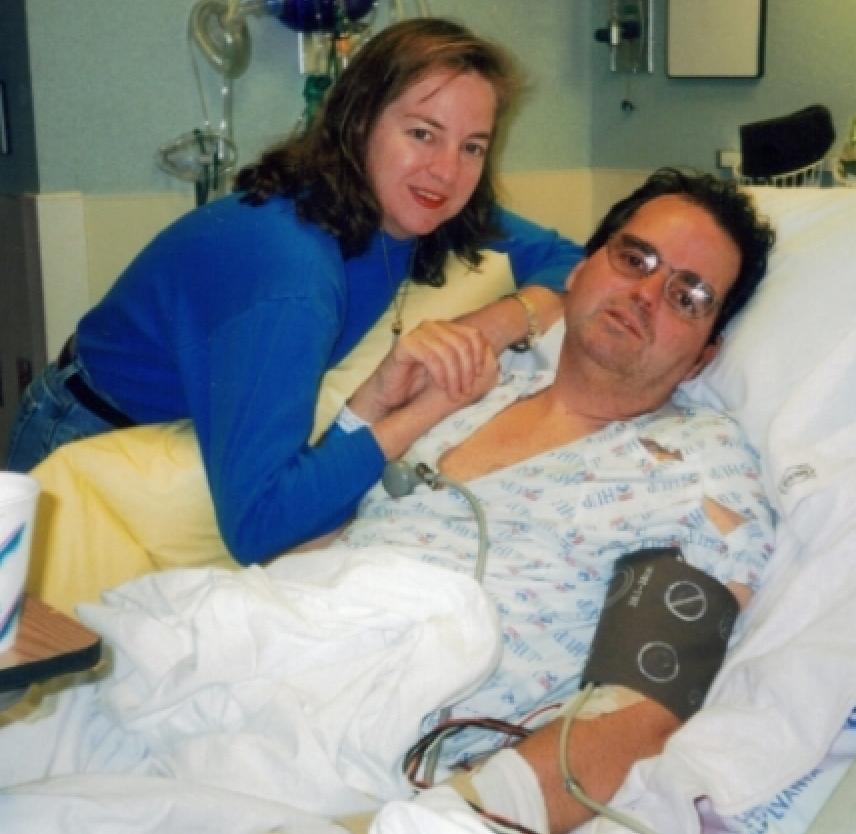
Early one morning last month, with sleepy eyes half open, I watched from our bed as my husband, Michael, got dressed for work in our small bathroom. He carefully studied the neck of his long-sleeved t-shirt, looking for the tag, before pulling the garment over his head. He pushed his arms through the sleeves and smoothed the front, checking himself out in the mirror. A moment later, he pulled his arms back out and rotated the shirt around his neck. He had put his shirt on backwards—again. I pretended not to see.
Every day, seemingly insignificant events drive home the depressing reality that life will never be the same as before my husband's experience with Acute Disseminated Encephalomyelitis (ADEM), a relatively rare neurological disorder. ADEM struck on Halloween 1999 without warning or explanation, causing intense, life-threatening swelling in the brain. Overnight, my 47-year-old husband became paralyzed on his left side, and soon lost all sensibility. He forgot our 10-month-old baby’s name. His speech was incomprehensible. He was angry and anxious—a monster to me—yet he was my husband, and I fought valiantly to save him.
Skilled doctors at the Hospital of the University of Pennsylvania in Philadelphia used various therapies including intravenous immunoglobulin and plasmapheresis to bring Michael back from near death--twice. Exhausting stints in rehabilitation followed. We were blessed to have had good health insurance and—especially during the initial crisis—the strong support of family and friends. Slowly, one day at a time, we worked to unravel the jumbled mess left behind by trauma to the brain.
The road back has been long and difficult, measured not in weeks or months, but in years. Today, more than 16 years post illness, we are deeply grateful for Michael’s remarkable recovery. A stranger meeting him might not realize anything had happened. Still, daily events big and small remind us our lives and relationship have changed in ways we never wanted, leaving us silently grieving for how we once moved together in the world.
It’s called ambiguous loss, a term I first learned last year when I met Rosemary Rawlins after she delivered a keynote at a hospital in our town. A loved one is physically present, yet transformed in countless, often subtle ways, that alter his essence. For couples coping with brain injury, it’s the elephant in the room. Can you remain committed to one another when your chemistry is different? Can you rekindle the spark, if years of stress and struggle have extinguished it?
The changes are hard to describe, but their impact on joyful living is immeasurable. When we first met, I was awestruck by the way Michael remained totally calm while running a busy television newsroom. Today, basic multitasking can be a real challenge, which puts many jobs out of reach. Michael works full time but in a completely new field that pays a fraction of his former salary. This unexpected career change has impacted everything from where we live, to the cars we drive, and most significantly, self-esteem.
Michael needs to nap before our infrequent date nights, critical insurance against the problems exhaustion always brings on: less sharpness, more irritability, even fights. He speaks differently now, his vocabulary smaller, and sometimes misuses words, like saying “intermediate” when he means “intermittent.” He claims he wants me to correct such mistakes, but usually I don’t. Doing so only makes him feel bad.
Coping with ambiguous loss is a matter of letting go of former goals and dreams, and striving to feel equally good about the ones now attainable. While most days the elephant lives tucked away in the corners of our minds, occasionally he comes out to join us, most often at the dinner table. What follows is open, gut-wrenchingly honest communication in hushed tones, the warm candlelight between us somehow softening the hurt. Acknowledging the elephant from time to time feels good: It clears the air, leaving us reassured and recommitted, knowing we’re both still on the same page.
Today, Michael does many things that once were impossible. While post illness he could not read, he’s an avid news junkie once again, devouring daily newspapers and Time magazine. While once his inability to concentrate left him unable to cook a simple meal, today he creates delicious dinners every night with ease. While once he was totally deflated, he has just been appointed to the board of a nonprofit that helps foster children, important proof for him that his intelligence and life experience are still highly valued.
One of the most positive steps for me has been the return of peace and harmony to our lives. ADEM temporarily immersed us in chaos, terror and grief. Today renewed energy, hope and happiness dominate in our home. Even though we’ll always share it with an elephant.
Sandy Levine is a NJ-based television producer who writes and speaks about her family’s experiences following her husband, Michael Fairhurst’s rare neurological illness. She presents keynotes and workshops on “Surviving and Thriving After a Crisis.” Learn more at sandralevine.com. View an 8-minute video about the family’s journey called “Michael’s Story” at this link.

Comments (6)
Please remember, we are not able to give medical or legal advice. If you have medical concerns, please consult your doctor. All posted comments are the views and opinions of the poster only.
Nicole replied on Permalink
Ambiguous loss is something that feels challenging for others to understand, and sometimes on a journey that already feels pretty lonely, it can add to the frustration. I really appreciate the balance of this article. The light and the heavy. It all plays into living with brain injury. Thank you for this. It is really well written.
Anonymous replied on Permalink
Anonymous replied on Permalink
Anonymous replied on Permalink
Anonymous replied on Permalink
Anonymous replied on Permalink